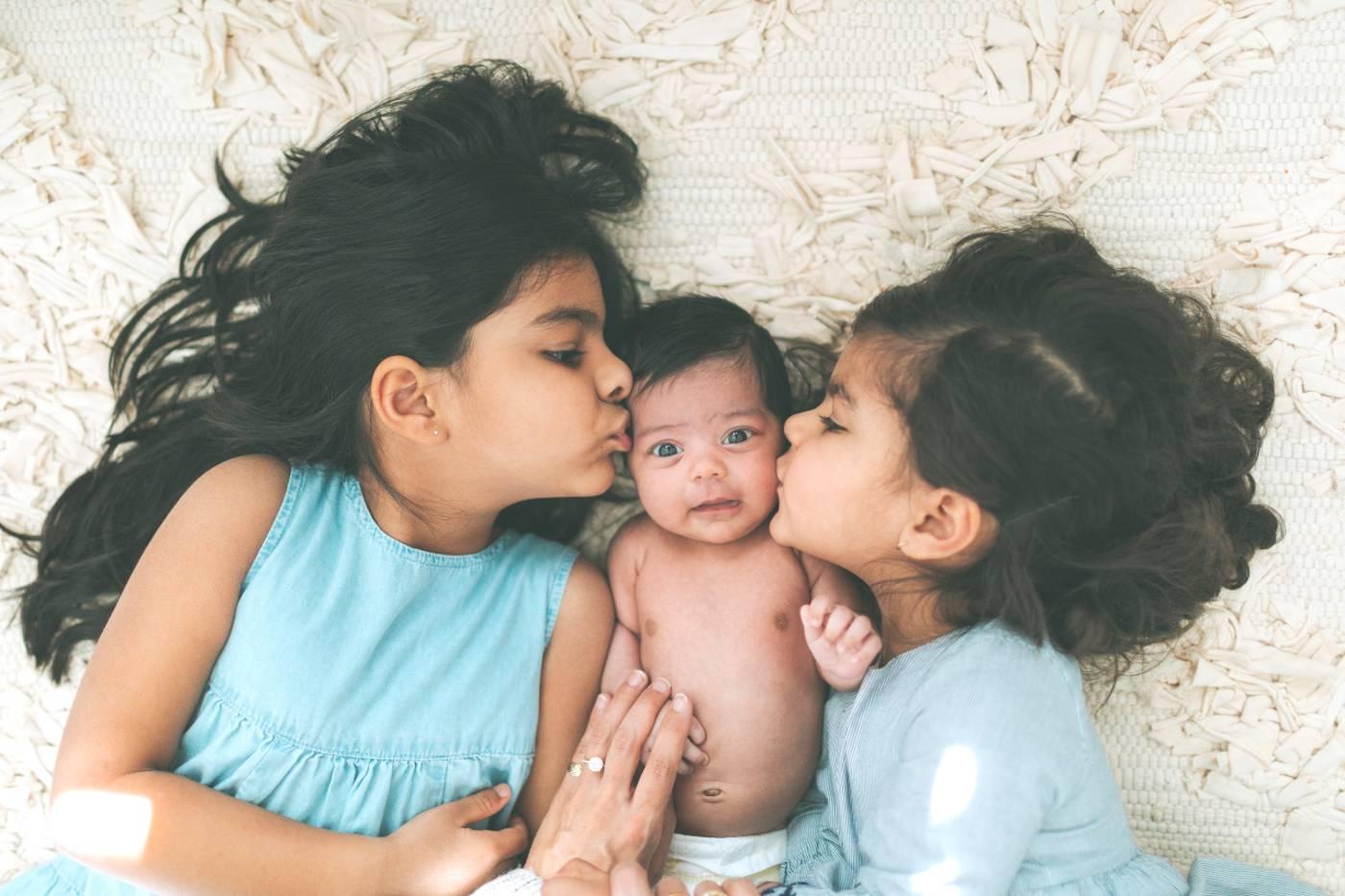PARENTS
What Birth Order Reveals About Your Child’s Personality
Can your child’s position in the family lineup can impact their future? Find out!

Written by
Happiest Baby Staff

With kids it’s almost guaranteed that your firstborn will be totally different than your second-born. And both of those kiddos will be a far cry from the baby of the family. Weird, right? Especially since siblings grow up in the same house with the same parents! Could it be due to each kids’ astrology sign? Seismic shifts in your parenting style? Or does it all boil down to birth order? Here’s how birth order—being the first, middle, youngest, or only child—may influence your child’s behavior and personality.
Birth Order Traits: Oldest Child Personality
The firstborn! The oldest sibling! The one who made you a parent! Unlike the other kids in your family, your firstborn got your full attention from the get-go…at least for a bit! They lived in a world where their smiles and sillies were the only antics you gushed over. Their naps were never interrupted because nobody else needed to be picked up from daycare. Not only did they not wear hand-me-downs, but every little thing about them was new! Of course, that means that parenthood was all new to you, too. There was a lot of trial and error, rule-following, and second-guessing.
As a result—or a coincidence—oldest children are thought to have these personality traits:
- Assertive
- Cautious
- Conscientious
- Determined
- Entitled
- Perfectionist
- Responsible
- Rule-follower
- Hard-working
- High-achieving
There have been numerous studies on birth order and, specifically, oldest child personality traits. While not all of the stereotypical firstborn qualities can be proven to be related to birth order, here’s what some of the research has determined:
- Firstborns are more likely to be the boss. A 2020 report in the journal PLOS One found that CEOs are significantly more likely to be firstborn than any other birth order. Plus, most of them believed their birth order contributed to their success.
- Oldest children are smarties. Some research suggests that firstborn children are more intelligent than their younger siblings thanks, in part, to all of that mental stimulation bestowed upon them before siblings came into the picture. Perhaps related, another study shows that there’s a higher than expected proportion of medical students who are firstborn or only children.
- Firstborns are responsible. A survey of nearly 2,000 adults found that the majority of firstborns consider themselves to be more responsible than their siblings.
- Oldest children are closer to Mom. Firstborn children tend to be more sociable and emotionally available to mothers than second-born children, according to a study in the journal Social Development. Perhaps that’s part of the reason firstborns consider themselves to be more family-oriented than their siblings.
- Firstborns may get sent to the principal’s office more. A 2021 study of 9- to 10-year-olds out of Japan suggested that firstborns may have more “conduct problems” than younger siblings. Researchers speculate that this may be a stress response to the change of a new sibling in the home.
Middle Child Personality Traits
By the time baby number two comes into the family, parents have learned a few lessons—and the rules get a little looser. Parents now know their infant will not, in fact, break if they don’t meticulously follow every word of their favorite parenting influencer. The result: Less hovering from you…and more independence from your kid!
Unfortunately, pop culture has inappropriately-dubbed this shift “neglect,” resulting in a lot of smack being talked about the middle-child. Enter: Middle Child Syndrome, which is supposedly marked by jealousy and feeling lost in the family shuffle thanks to being sandwiched between the high-achieving eldest and the precocious youngest. The good news? According to the American Psychological Association (APA), Middle Child Syndrome is a hypothetical condition.
Nevertheless, there are some characteristics that are thought of as middle-child traits, such as:
- Adaptable
- Difficulty sticking up for themselves
- Easygoing
- Friend-focused
- Independent
- Mature
- Peacemaker
- People-pleaser
- Strong social skills
- Team-player
It seems fitting there seems to be less research available on middle-child character traits than there is for firstborns. The upshot? The birth order research that has been done doesn’t fully support the notion of the invisible, jealous middle child. Plus, the APA notes that being the middle-born may only have small, subtle influences on a child’s personality and intelligence.
Here’s what some research has found:
- Middle children look to sibs for a shoulder to cry on. One study found that middle-borns are more likely than first- and last-borns to turn to a sibling in times of distress.
- Middle children may be more reserved. Save the lampshade-on-head antics for your siblings! Middle children are more reserved and less extroverted than their younger and older siblings, finds a 2021 report out of the Middle East.
- Middle children are “grown-up.” The 2021 report mentioned above noted that middle children are apt to “think more adultlike” in order to be a good example for their younger siblings.
- Middle children care about fairness. Researchers have found that the middle-born child value fairness, understanding, cooperation, and adaptability—all while being a wee bit competitive.
- Middle children are loyal. Middle children tend to be loyal and faithful in their relationships—and they’re good at relating to both older and younger people, according to experts at Johnson and Wales University in Providence, Rhode Island.
Youngest Child Personality Traits
Much like their animated cohorts Maggie Simpson and Stewie Griffin, the youngest member of the family is sometimes stuck in perpetual babyhood—or so it seems. While they grow out of diapers and SNOO, they seem to hold onto a very distinct “baby of the family” vibe. The likely reason? When it dawns on parents that this child is the very last, there’s the temptation to baby the baby for….ever. (Perhaps that’s why Kevin, another famed youngest, from Home Alone, is shook by the prospect of packing his suitcase all by himself!)
That said, once the last child joins the family ranks, parents are brimming with experience. This may make them less cautious and more relaxed, which can put far less pressure on the youngest child, leaving room for the baby to explore their creativity and social acumen.
Here, some traits that are thought of as youngest child characteristics:
- Attention-seeking
- Charming
- Dependent
- Entrepreneurial
- Funny
- Outgoing
- Rebellious
- Risk-taking
- Self-centered
- Wily
Is there any solid science behind these youngest child attributes? The answer is: some! Oftentimes, birth order theories are anecdotal, meaning families witness certain behaviors and characteristics among their firstborns, middle children, and the youngest…with no rigorous placebo-controlled research to echo their lived experience.
Still, here’s what a handful of studies and surveys have found regarding the youngest child:
- Youngest children are resilient. Good news for the baby of the fam: A 2021 report on 9- and 10-year-olds in Frontiers in Psychiatry found that last-borns were the most resilient of the siblings—and they exhibited the most “prosocial behaviors,” like sharing and comforting.
- Youngest children are business-minded. The youngest member of the family is thought of as a risk-taker—and that stereotype holds true in the business world, too. Research in the journal Personality and Individual Differences found that the youngest in the family is between roughly 50 to 65% more likely to take a risk of being an entrepreneur than their siblings.
- Youngest children are funny. Ali Wong, Bo Burnham, Jim Carrey, Jon Stewart, Stephen Colbert, and many more professional comedians are the youngest in the family, which is right on brand! British research shows younger siblings are more likely to say they’re the funniest sibling.
- Youngest children are explorers. Experts note that last-borns may become “explorers and good observers,” thanks to the fact that they tend to get more freedom than their older siblings.
- Youngest born kids think they’re the favorite. Whether it’s true or not, research shows that the baby of the family is far more likely to fancy themselves Mom’s Favorite than their older siblings.
Only Child Personality Traits
Your singleton is far from alone! According to the Pew Research Center, in 2015 there were twice as many families with one child now as there were 40 years earlier. But just because there’s been a rise in one-and-done parenting, doesn’t mean the only-child stereotypes have settled down. It’s easy to assume that children who grow up sibling-free would be more self-centered, lonely, stubborn, and dependent on their parents, but that’s not really the case!
These are some of the characteristics more typical of an only child:
- Cautious
- Confident
- Curious
- Feedback-seeking
- High-achieving
- Leader
- Loyal
- Mature
- Sensitive
- Stubborn
As with other members in the birth order schema, only children are often typecast to fit a certain idea of what they’re supposed to be. And, a lot of the time, those assumptions are negative—and untrue! Research has shown that only children are not inherently maladjusted, reclusive, or self-involved! In fact, a 2019 study found zero evidence that only children are more narcissistic than those with siblings.
Experts have found that only children possess these characteristics:
- Only children are creative. Research in Brain Imaging and Behavior found that singletons not only performed better on the creativity tasks than those with brothers and sisters, but they also had more gray matter in the part of the brain believed to be linked to mental flexibility and imagination.
- Only children do better in school. When it comes to academic success, it seems only children fare better than those with siblings, according to a study in Child Development Research. Researchers speculate that undivided resources and “heightened parental responsiveness” may make the difference.
- Only children are just as social as others. Research has shown that young adults without siblings are actually more socially active in church, synagogue, and in literary, art, or academic events than other adults.
- Only children are independent. Experts note that only children are more likely to grow up to be independent because they never had siblings around to introduce them to their friends. Instead, singletons get out there and forge their own way!
- Only children are team players. When it comes to teamwork activities, only children may be more reluctant to join, but when they do, they outperform their counterparts with siblings, notes a 2021 study in the journal Applied Economics.
Birth Order Bottom Line
When you dig into the research on only children, it’s hard to see any glaring alarm-bells-ringing personality differences between those with siblings and those without. And for families with more than one kiddo, take heart. Experts from the University of New Mexico note that the power of sibling relationships can be “life-changing in a positive way,” no matter where you fall in the family lineup!
More on Siblings:
- Memorable Sibling Pregnancy Announcement Ideas
- Best Books About Becoming a Big Sibling
- Dr. Harvey Karp on How to Stop Sibling Fighting
- Baby Sprinkle Ideas For Kid #2 (and Beyond!)
****
REFERENCES- Are chief executive officers more likely to be first-borns? PLOS One, June 2020
- The Early Origins of Birth Order Differences in Children’s Outcomes and Parental Behavior. The Journal of Human Resources. November 2016
- A survey of birth order status of students studying for medical degree at the University of Sheffield. JRSM August 2014
- YouGov: It's true: birth order shapes personality
- Continuity, stability, and concordance of socioemotional functioning in mothers and their sibling children. Social Development. August 2018
- Association of Birth Order With Mental Health Problems, Self-Esteem, Resilience, and Happiness Among Children: Results From A-CHILD Study. Frontiers in Psychiatry. April 2021
- American Psychological Association, APA Dictionary of Psychology: middle-child syndrome
- Birth Order and Familial Sentiment: Middleborns are Different. Evolution and Human Behavior. September 1998
- Diagramming Mythical Reality: A Qualitative Analysis of Middle Children's Identity Check, Phenomenology. International Journal of New Technology and Research. December 2021
- Johnson and Wales University: How Birth Order Impacts Your Personality
- Are ‘born to rebel’ last-borns more likely to be self-employed? Personality and Individual Differences. October 2016
- CNBC: What type of leader are you? It may depend on whether you’re an older or younger sibling, psychologist says
- Pew Research Center: Parenting in America
- The End of a Stereotype: Only Children Are Not More Narcissistic Than People With Siblings. Social Psychological and Personality Science. September 2019
- Only-child and non-only-child exhibit differences in creativity and agreeableness: evidence from behavioral and anatomical structural studies. Brain Imaging and Behavior. March 2016
- Comparing Adolescent Only Children with Those Who Have Siblings on Academic Related Outcomes and Psychosocial Adjustment. Child Development Research. January 2014
- Growing Up Without Siblings And Adult Sociability Behaviors. Child Development Research. Journal of Family Issues. March 2011
- Peter McGraw: The Only Child
- Are Only-Children Difficult Team Members? Applied Economics. July 2021
- University of New Mexico: The Importance of Siblings
Disclaimer: The information on our site is NOT medical advice for any specific person or condition. It is only meant as general information. If you have any medical questions and concerns about your child or yourself, please contact your health provider.
SHARE THIS ARTICLE
MOST LOVED
Sleepytime Sidekicks












